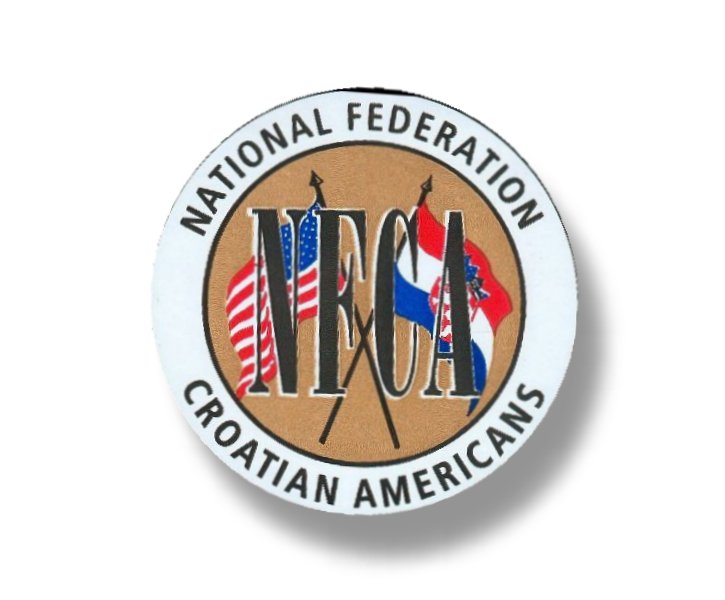
NATIONAL FEDERATION OF CROATIAN AMERICANS CRITICIZES TESTIMONY OF DEPUTY ASSISTANT SECRETARY OF STATE ROBERT A. BRADTKE
Washington, D.C. (July 8, 2004). The National Federation of Croatian Americans (NFCA) today released the text of a letter written by its President, Edward A. Andrus, responding to the June 16, 2004 testimony of Robert A. Bradtke, the Deputy Assistant Secretary for European Affairs, given before the House of Representative's International Relations Committee's Subcommittee on Europe.
In his testimony, Deputy Assistant Secretary Bradtke discussed Croatia's prospects for NATO membership. Bradtke said that Croatia needed to show further "progress" on the case of Croatian General Ante Gotovina, pending before the International Criminal Tribunal for the Former Yugoslavia (ICTY), as a condition to NATO membership. Bradtke further placed the ICTY indictment against Croatian General Ante Gotovina on par with the indictments brought against Serbian General Ratko Mladic and Bosnian Serb Leader Radovan Karadzic. Bradtke also discussed the "successes" NATO had had with respect to its peacekeeping mission in Bosnia and Herzegovina.
Mr. Andrus initially pointed out that the indictments against General Gotovina cannot be compared with those against Mladic and Karadzic. He noted that unlike the indictment against General Gotovina, both Mladic and Karadzic have been charged with the crime of genocide. Mr. Andrus emphasized that "Mladic and Karadzic are unquestionably responsible for the deaths of hundreds of thousands of people in Croatia, Bosnia and Herzegovina, as well as Kosovo. Historical facts show that they directed and commanded Serbian forces to engage in systematic killings, rapes and destruction." In comparison, the indictment against General Gotovina "is solely grounded in the claim that he did not take adequate actions to prevent criminal acts by soldiers under his command following the liberation of Serbian occupied territory. Allegedly, no more than 100 to 400 civilians were killed as a result. There is no evidence that General Gotovina directed such killings. In any event, the magnitude of those allegations is a far cry from those crimes alleged against Karadzic and Mladic," he noted.
Mr. Andrus further questioned the reasons behind tying "progress" on the General Gotovina case with Croatia's prospects to join NATO. "Surely, there is no precedent that one can point to where the arrest of a fugitive, whose whereabouts are unknown, forms a stumbling block to greater integration into Western institutions." Mr. Andrus argued that such a policy is especially troublesome in connection with Croatia. Mr. Andrus noted that even President Clinton admitted in his recently published memoirs that Croatia "acted as America's proxy in the region in re-establishing a balance of power in Southeastern Europe. It was military actions undertaken by such men as General Gotovina which achieved this balance. These military successes led directly to the foundation for the Dayton Peace Accord."
Mr. Andrus emphasized that Croatia allowed NATO use of its airspace during NATO's 1999 war against Serbia and has played an active role in the war on terrorism, including sending a military police contingent to Afghanistan and assisting U.S. efforts in monitoring Al Qaeda activities in neighboring Bosnia and Herzegovina. Mr. Andrus wrote that "Croatia's cooperation with NATO and the United States in these matters is an out growth of its status as one of the most stable, democratic, and prosperous nation-states in Southeastern Europe."
Mr. Andrus further took issue with NATO's claimed successes in Bosnia and Herzegovina. In addition to noting that NATO's greatest failure in its mission has been its inability to capture Karadzic and Mladic despite being in control of the country for almost 10 years, Mr. Andrus stressed that the peace which NATO has secured in Bosnia and Herzegovina "has come at the expense of establishing a functioning democratic state which respects the rights of minorities. Croats are the smallest of the three constituent peoples of Bosnia and Herzegovina. Their rights to cultural autonomy and religious freedom have been increasingly trampled on . . . . This bodes ill for the future stability of that country and the ultimate success of the NATO mission there."
Mr. Andrus concluded his letter by noting that the "Croatian community in the United States fully supports" the entry of Croatia into NATO and that of Bosnia and Herzegovina into the Partnerships for Peace. Mr. Andrus called on the United States to "move energetically" to secure the rights of all of the people of Bosnia and Herzegovina to peace, democracy, and security. With respect to Croatia, Mr. Andrus wrote that the NFCA believes that the Republic Of Croatia "has shown that it has more than adequately met the criteria for membership in NATO. We urge that the United States support Croatia's entry into NATO at the earliest opportunity."
The NFCA is a national umbrella organization of Croatian-American groups which collectively have approximately 130,000 members.
For more convention information, please call Joe Foley, Government Relations Director, at 301-294-0937 or Erik Milman, the NFCA's Director of Development, at the NFCA's headquarters at 202-331-2830 or by email atNFCAhdq@aol.com.